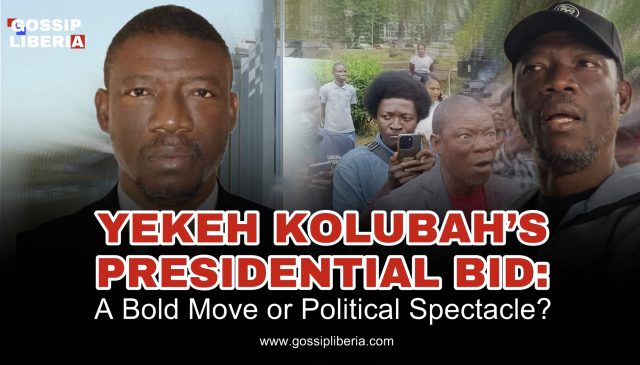Montserrado Lawmaker Faces Scrutiny Over Leadership Credentials and National Vision
MONROVIA, LIBERIA – The announcement of Yekeh Kolubah, Montserrado County District 10 Representative, to contest the 2029 presidential election has sparked intense political debate across Liberia. The outspoken lawmaker, known for his fiery rhetoric and relentless criticism of past and present administrations, is positioning himself as a candidate for change. However, a closer examination of his political record raises pressing questions about his readiness and capacity to lead the nation.
Since his entry into politics, Kolubah has been a polarizing figure, often making headlines for his confrontational style rather than for legislative achievements. His tenure in the House of Representatives has been characterized by public outbursts, verbal clashes, and personal attacks, overshadowing his role as a policymaker. While he has been vocal about corruption and misgovernance, he has rarely translated his criticisms into tangible legislative or developmental actions.
Governance demands more than just rhetoric; it requires strategic planning, coalition-building, and effective policymaking. Yet, Kolubah’s record lacks any significant legislative contributions, raising concerns about whether his presidential ambitions stem from a genuine desire to lead or a personal quest for power.
The Montserrado District 10 Representative has served multiple terms in the Legislature, but his impact on national policymaking remains minimal. Unlike other lawmakers who have championed bills, policies, and community-driven projects, Kolubah’s tenure has been largely defined by political theatrics rather than governance.
Residents of District 10 continue to face poor infrastructure, economic hardship, and inadequate public services, despite his years in office. If Kolubah has struggled to drive meaningful change within a single district, his ability to effectively govern an entire nation is a matter of concern.
A nation’s leader must be a unifier, someone capable of bringing diverse political and social groups together for the sake of national progress. However, Kolubah has built his political identity on provocative statements, incendiary remarks, and confrontational politics, making him one of Liberia’s most controversial politicians.
Liberia, a country still healing from years of political instability, requires leadership that fosters unity and national development. Many critics argue that Kolubah’s combative approach makes him ill-suited for such a responsibility. His ability to work across political lines and navigate the complexities of governance remains untested and, for many, doubtful.
Kolubah has framed his candidacy around the slogan: “Da the young people time.” While appealing, youth alone is not a qualification for the presidency. Leadership demands competence, experience, and a proven track record of results—qualities that critics argue Kolubah has yet to demonstrate.
A presidential candidate must present a clear economic strategy, a policy roadmap for job creation, and a plan to address Liberia’s pressing challenges in education, healthcare, and governance. So far, Kolubah’s campaign appears to be built more on personal ambition and political vendettas than a structured vision for national progress.
Liberia has endured decades of leadership challenges, and the 2029 election presents an opportunity for voters to prioritize qualified, results-driven candidates over mere political firebrands. While Kolubah’s outspoken nature has made him a household name, leadership is about more than just making noise—it requires delivering results.
As Liberia moves toward the next electoral cycle, the electorate must critically assess candidates based on competence, past performance, and a clear vision for national development. Yekeh Kolubah, for all his boldness and outspokenness, has yet to convince Liberians that he possesses the qualities necessary to lead the nation into a stable and prosperous future.












